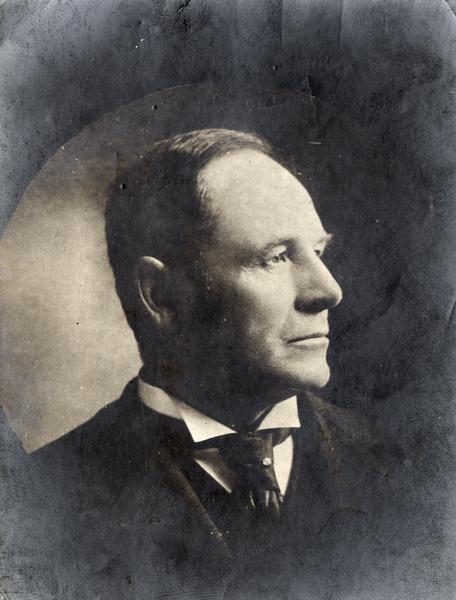Appleby, John Francis (1840 - 1917)
Inventor

 Portrait of inventor John F. Appleby. The Wisconsin inventor is credited with inventing a knotting mechanism that made twine grain binders possible in the late 1870s. The original caption reads: "John F. Appleby Inventor of Twine Binder." View the full image here.
Portrait of inventor John F. Appleby. The Wisconsin inventor is credited with inventing a knotting mechanism that made twine grain binders possible in the late 1870s. The original caption reads: "John F. Appleby Inventor of Twine Binder." View the full image here. Early Life
John Francis Appleby was born in Westmoreland, NY. In 1845 he moved to Wisconsin with his parents and settled on a farm near Palmyra. In 1858, while working on his step-father's farm in Iowa County, Appleby invented the basic knotting device that was to become the foundation for all farm binding machinery. Although Appleby was thinking in terms of a grain binder, his device was regarded as a curiosity at this time and the idea languished for several years.
During the Civil War he served with the 23rd Wisconsin Infantry from 1862 to 1865, and during this time, he invented a cartridge magazine and a needle gun. When the gun was rejected by the government, Appleby sold the patent cheaply and the weapon was later used extensively in the Prussian army.
Inventions
Returning to Wisconsin at the close of the war, he settled near Mazomanie where he tested his first grain binder unsuccessfully in 1867. In the early 1870's he moved to Beloit where he continued his experiments in the farm machinery shop of Charles H. Parker and Gustavus Stone.
In 1874 he developed a successful wire binder, but was refused financial support because of farmer resentment against the use of wire binding. In that same year he returned to Mazomanie and formed the Appleby Reaper Works to construct self-rake reapers. After several months he went again to Beloit where, with the backing of Parker and Stone, he perfected a successful twine binder on which patents were issued in 1878 and 1879.
Shortly after the first patents were issued, William Deering, of Gammon and Deering, purchased a license to build the binders, and large-scale production was begun. Within a few years the twine binder had completely replaced the unpopular wire binders and Appleby's design soon became the basis for machines produced by the McCormick, Champion, and Osborn companies.
Late Life
In 1881 Appleby sold his patent interests to the Champion Machine Works of Springfield, Ohio, and left the state. He continued to work on various inventions and eventually patented a horse-drawn cotton picker. He died in Chicago, where he spent the latter part of his life.
Learn More
See more images, essays, newspapers and records about John Francis Appleby
Dictionary of Wisconsin History
Explore more than 1,600 people, places and events in Wisconsin history.
[Source: Dictionary of Wisconsin biography]
